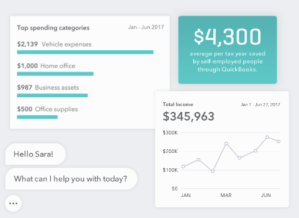
Artificial intelligence (AI) and machine learning (ML) are changing the world. These technologies make computer programs “smart” by helping them to:
- Learn, predict patterns and spot anomalies
- Recommend and implement new processes and activities
- Converse with users to answer questions, and provide analytics and insights
These technologies have already become a mainstay in our personal lives. Devices that connect our homes, cars, workouts and much more to the Internet deliver fast, easy access to the information we want, when we want it.
But how can small businesses take advantage of them? One of SMB Group’s Top 10 Technology Trends for 2017 was “The Rise of Smart Apps For SMBs..” We discussed the fact that while these consumer oriented use cases are getting most of the attention, vendors were starting to put AI and ML to work to develop smart apps to help small businesses.
At Intuit’s 2017 QuickBooks Connect a couple of weeks ago, Intuit made three big announcements that underscore just how much of a game-changer these can be.
Intuit’s Strategy to Help Small Businesses Get Smart
Last year, Intuit announced plans to use AI and ML to broaden its QuickBooks Online platform into a business advice and education platform, drawing on aggregated data from its (then) 1-million-plus database of QuickBooks Online small business and self-employed customers.
Over the past year, Intuit’s plans have turned into concrete offerings that address some of the biggest challenges that small businesses face:
- Connecting with people who can help establish and develop the business
- Accessing information and insights to make better decisions
- Making it easier to manage cash flow
With over seven million QuickBooks customers, hundreds of thousands of developer and accountant partners, Intuit has access to billions of data sources to apply to its AL/ML initiatives. Intuit’s leadership position in the small business accounting market provides it with a comprehensive and dynamic view of its customers’ businesses and finances.
Based on this foundation, Intuit announced three programs to help connect its customers to the people, information and funding they need to run and grow their businesses:
- Smart Connections, which Intuit envisions as a network to connect small businesses with the right people to help them start and grow their businesses. Intuit is connecting small businesses with accountants via Find-a-ProAdvisor—a vital connection as Intuit reveals that 89% of small businesses say they are more successful when they use an accountant.
 One of the first questions Intuit asks new QuickBooks customers is whether or not they have an accountant, and if not do they want to find one? Intuit helps match those that do to accountants and bookkeepers listed on its Find-a-ProAdvisor platform. Smart Connections also provides accountants who use QuickBooks Online Accountant a one-stop shop to provision, bill and manage clients, and to find and recommend new applications to users as needs arise. Over time, Intuit plans to expand Smart Connections to connect QuickBooks users with other vendors, customers and employees.
One of the first questions Intuit asks new QuickBooks customers is whether or not they have an accountant, and if not do they want to find one? Intuit helps match those that do to accountants and bookkeepers listed on its Find-a-ProAdvisor platform. Smart Connections also provides accountants who use QuickBooks Online Accountant a one-stop shop to provision, bill and manage clients, and to find and recommend new applications to users as needs arise. Over time, Intuit plans to expand Smart Connections to connect QuickBooks users with other vendors, customers and employees. - Smart Decisions, which gives small business and self-employed decision-makers the information they need to make better, more confident decisions.
 For example, QuickBooks Assistant (available now for QuickBooks Self-Employed, and in beta for QuickBooks Online) is a virtual assistant, lets users query their phones in a Siri-like fashion to get answers to questions such as, “How much money did I make this month?,” Where did I spend the money?,” or “What clients owe me money?” QuickBooks Assistant can also take care of a lot of rote data entry and categorization tasks. Automatic mileage tracking, for instance, tracks mileage every time you drive your car—whether the QuickBooks Self-Employed app is open or not; when you have time, you simply swipe to the left or right to tag the mileage as a business or personal expense. Other examples include automatic categorization in QuickBooks Online, which suggests the best possible category match for every bank transaction you download; and Expense Finder, which helps users to identify and sort tax potential deductions into Schedule C categories.
For example, QuickBooks Assistant (available now for QuickBooks Self-Employed, and in beta for QuickBooks Online) is a virtual assistant, lets users query their phones in a Siri-like fashion to get answers to questions such as, “How much money did I make this month?,” Where did I spend the money?,” or “What clients owe me money?” QuickBooks Assistant can also take care of a lot of rote data entry and categorization tasks. Automatic mileage tracking, for instance, tracks mileage every time you drive your car—whether the QuickBooks Self-Employed app is open or not; when you have time, you simply swipe to the left or right to tag the mileage as a business or personal expense. Other examples include automatic categorization in QuickBooks Online, which suggests the best possible category match for every bank transaction you download; and Expense Finder, which helps users to identify and sort tax potential deductions into Schedule C categories.
- Smart Money: Small businesses often face a cash crunch. They need money to get started, to keep the lights on, to bring in new customers, to hire employees, pursue a new opportunity, and more.
 According to Intuit, over 70% of small businesses need funding in the first five years, but only 23% can get it. Meanwhile, small businesses have to wait more than 60 days to get paid on over 2/3 of their invoices. Intuit introduced QuickBooks Capital to help these companies get the funding they need. The program will provide access to 6-month loans, ranging from $15,000 to $35,000.
According to Intuit, over 70% of small businesses need funding in the first five years, but only 23% can get it. Meanwhile, small businesses have to wait more than 60 days to get paid on over 2/3 of their invoices. Intuit introduced QuickBooks Capital to help these companies get the funding they need. The program will provide access to 6-month loans, ranging from $15,000 to $35,000.
Intuit has built a credit model based on more than 26 billion data points collected from the QuickBooks ecosystem, and advanced data science, to streamline the loan process. QuickBooks users can apply in minutes, and Intuit will process the loan, and (if approved), funds are deposited to a user’s account within days. Intuit has been running a beta for the program since February, and has found that:
- 46% of borrowers had never applied for a loan before
- 90% of borrowers used funding to fuel growth.
- 99% of customers are satisfied with the offering.
Intuit has seeded the beta program on its own, but is exploring partnerships with others to fund the program when it officially launches.
Perspective
Small business owners wear many hats. It’s often hard for them to find the time, expertise and resources to streamline operations, run reports and analyze data, and obtain funding when they need it.
Cloud computing has lifted the technology burden of deploying and managing business applications off the backs of small businesses. Now, AI and ML promise to lift some of the business burdens. Smart applications can provide the automation, insights and connections they need—without the heavy lifting.
To work well, and improve, smart applications and services require lots of data. To that end, Intuit, with its large user base and repository of financial data, is incredibly well-positioned to help both small businesses and accountants put this power to work. AI and ML infused solutions can give small businesses the insights and capabilities they need to run their companies more easily, efficiently and successfully. And, accountants can use the QuickBooks Online Accountant platform as a springboard to grow their practices and offer new services to clients.
Over its 34-year history, Intuit’s goal has remained the same: to help small businesses be more successful. As evidenced at QuickBooks Connect, Intuit is continuing this trajectory, investing in AI, machine learning, and other technologies to provide its customers and partners—as well as Intuit—with new and better ways to continue to thrive in today’s digital age.
This post is sponsored by Intuit.
